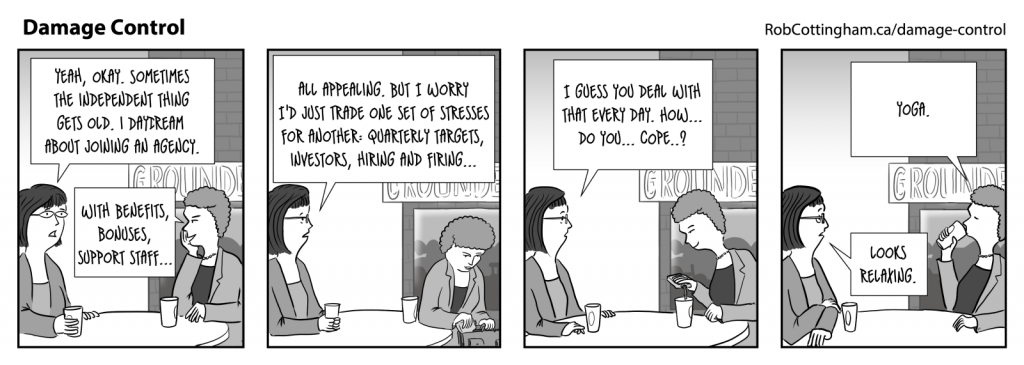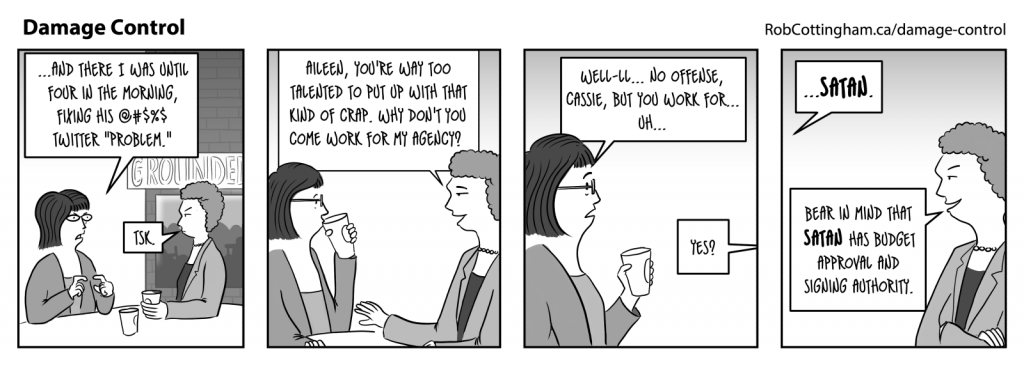Hair of the Downward Dog that bit you?
Posts authored by rob
Sympathy (and an invoice) for the devil
Sure, Satan has a huge comms budget and a clear motivation to spend it.
On the other hand, the contract negotiations are brutal.
“I’m a little troubled by this language right here referring to my immortal soul…”
“Eh, that’s just boilerplate. Not to worry.”
“So you won’t mind if I strike it out?”
“I WILL FEAST ON YOUR ENTRAILS IF YOU TOUCH ONE COMMA.”
Better late than never
I have overheard the damnedest stuff while working in coffee shops. I’ll be writing away while the person at the next table is bellowing into his phone that of course we’re going to win the contract, we’ve paid off the right people and it’s in the bag, and if Martin doesn’t think so then no wonder Martin doesn’t realize he’s history as soon as he finishes documenting his code.
Or Well, then, I guess you’ll just have to lie your face off, won’t you? Come on, it’s a radio reporter, for Christ’s sake. Dumb as a brick and half as good-looking, or he’d be on TV instead.
Or Nobody, I mean nobody, can know we’re remaking [name of movie redacted]. Okay? Cos otherwise the lawyers are all over it, and we’re sitting around with our thumbs up our asses for the next three years.
Or I just crop “Noise to Signal” off the top of the cartoon, slap my own name on it and bam: I’m a cartoonist. Of course it’s legal – that’s what a Creative Commons license is for.
Or Hold on a moment while I move – I think the guy at the next table is eavesdropping.
I mean, really.
P.S. – We’re back! Thanks for waiting. You, especially, for gently reminding me.
10. Gaffe
Oh, that moment when you’ve said something you wish you hadn’t. In public. To a big audience.
It’s doubly tricky because the adrenaline starts squirting into your bloodstream and your judgement is suddenly impaired. There are a lot of times when your instincts will serve you well, but this may not be one of them. Your fight-or-flight mechanism may well be tempting you to wrap your comments quickly, get the hell off the stage and then hide… or, worse, to double down. “Yeah, that’s right! I just said I support shooting Canada Geese! What’s more, I support locking up kindly old people who toss out bread crumbs for them! And I think every youth between the ages of 12 and 17 ought to be conscripted into an army whose sole purpose is to wipe out the little lawn-soiling bastards! Uh, the geese. Not the elderly.”
Take a breath. Take two. Assess what you’ve just said. And consider telling your audience something like “You know, that didn’t come out the way I intended. Here’s what I actually think…”
9. The roster
The Q&A session: for many speakers, the part of a presentation they dread the most. It’s the part they can’t script, can’t control, can’t reduce to three terse bullet points and a cute photo of a baby using a computer.
Me, I love questions and conversation, and I encourage them throughout my sessions. For one thing, if someone’s confused about a point, or if I’ve said something way off the mark, I don’t want them either lost at sea or stewing in silence throughout the whole thing. And for another, if you’re engaging your audience actively from the outset, chances are a lot fewer minds will be wandering around the 20-minute mark.
One of the great things about social media is the way it’s transforming the audience/speaker relationship, with the rise of live backchannels on services like Twitter, and the evolution of supportive infrastructure like wikis that ensure the exchange of knowledge and ideas goes on well before the speaker gets on stage and long after they step down.
But that means the unpredictability and give-and-take of a Q&A are now happening throughout your speech. Just how you cope with it – and not only cope, but thrive – is the focus of The Backchannel, a great book by Cliff Atkinson. He has a number of suggestions that are well worth following: among them, taking regular “Twitter breaks” during your session; having another person monitor the backchannel and feed you questions to answer from the stage; creating an online hub to support your presentation; and distilling your key points into easily-tweeted slides.
—
Your voices have been heard! It’s back to hand-lettering – at least for the time being.





